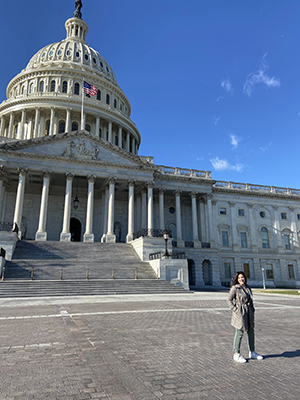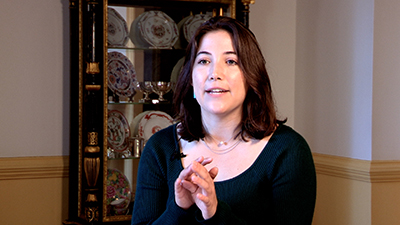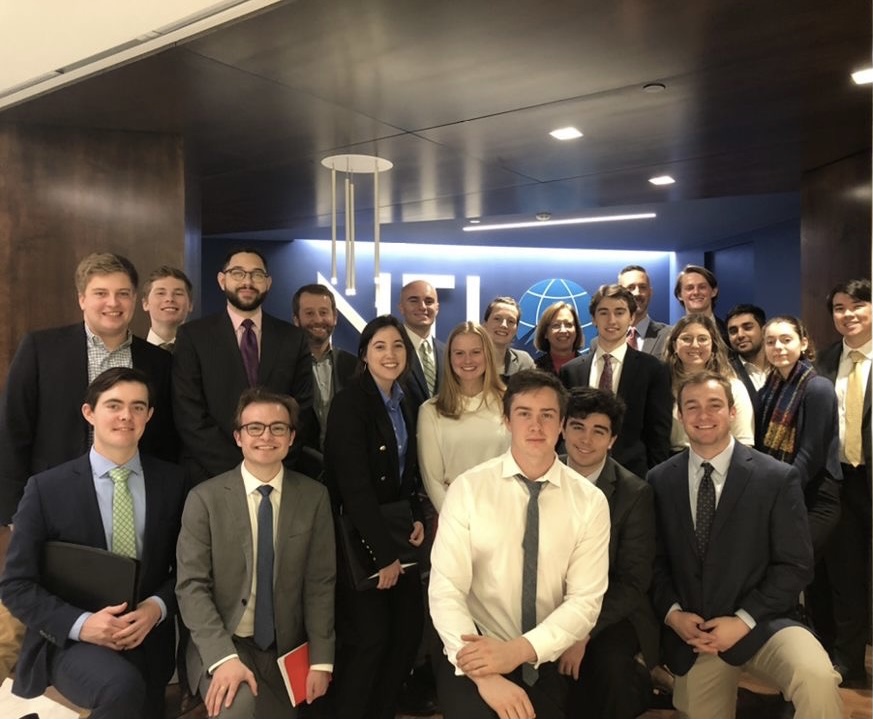A Harriman Fellowship sends a William & Mary student to the intersection of English, government and national security
By Kate Hoving
Paige Groome ’22 government major and English minor, thought she had her 2021 summer all set. “The original plan was to try to work in the U.S. Embassy in Oslo, Norway.”
set. “The original plan was to try to work in the U.S. Embassy in Oslo, Norway.”
For an International Security class with Amy Oakes, University Associate Professor for Teaching Excellence and Director, International Relations Program, she had written a memo about the Arctic Council, an international forum which is based in Norway. “It was about the race to secure the Arctic, and how Russia and China and the U.S. are all grappling with it. I’ve been really excited about that kind of Scandinavian politics.”
Her next step on the path to Norway had been summer 2020, when she had worked at the CoronaNet Research Project, a global organization that compiles a database on government responses to the coronavirus. CoronaNet followed government policy regarding COVID-19 so adjustments, such as quarantine mandates and other policy protocols could be tracked and recorded.
Groome was one of two international research assistants assigned to Norway, which only added to her interest in Norwegian politics and international affairs. “I got to read Norwegian newspapers with Google Translate, and there was also a lot of English information available, and it was really fascinating.”
But COVID-19, which gave her an opportunity to learn more about Norway, was the thing that upended her plan for an in-person internship in Oslo in summer 2021.
Like all good foreign service officers, she responded to the disruption with flexibility and an open mind, and was able to transition to a virtual internship at the U.S. State Department in D.C. Having accepted the position with the State Department, she became eligible to apply to the Pamela Harriman Foreign Service Fellowship. The process is very competitive, but she decided to apply and was accepted as the sole recipient of a fellowship to the U.S. State Department in D.C.
“Honestly, I had a lot of fun with the interview process,” she recalls. “I was talking to former ambassadors and career State Department folks who were really enthusiastic.”
ambassadors and career State Department folks who were really enthusiastic.”
She also was able to learn about Ambassador Pamela Harriman, in whose name the fellowships were established. “I really appreciated how she was so focused on encouraging the younger generations and interested in supporting and motivating them to launch a career as a public servant.”
A virtual detour
“I didn’t really know what to expect. I was just going in, excited to be connected with the State Department and hoping to get a personal view of work in the foreign service.” But what she actually got was so much more.
“It was definitely a little bit of an adjustment [being virtual], but I had a great supervisor and a team that was really interested in getting to know me as an intern and was really supportive.”
Groome was a virtual intern at the Global Engagement Center (GEC), which is responsible for protecting the U.S. from foreign disinformation and propaganda.
More specifically, she was working for the Technology Engagement Team at the GEC. The Technology Engagement Team is responsible for assessing technologies that could help with gaps in the disinformation space so they team up with foreign partners, the private sector and academia to assess and compile information on challenges that different groups are having with foreign disinformation and propaganda and to help alleviate those concerns.
“One of my projects was to research 5G/6G and virtual reality. I looked at deepfakes with regard to entertainment apps. I was also able to attend what we called Tech Demos, which is where companies would come in and pitch their technologies that they thought could help alleviate some of the challenges of disinformation and propaganda. I was responsible for attending those meetings and writing up the reports.”
She was using her communication and research skills in a new, unexpected way.
“This was a totally new realm of international security for me, which was very exciting. As someone who enjoys English classes and really loves the English department here, I was excited to get to tap into disinformation and propaganda.
“It’s really fascinating to see the kinds of themes and how disinformation was shared and what was actually convincing--what caught people’s attention more than others. It’s really interesting to draw from my interest in literature to analyze how [foreign agents] are conveying information.”
Working in an area that was new to her, she was finding that she was able to combine her interests: government theory, international interaction, communication strategies and how people talk to each other.
She also got some unexpected writing coaching.
“I got trained in government style writing which is a little bit different from other writing I’ve done before. It’s very to the point. It’s who did what, where, when. Very similar to journalistic writing.”
She compares the process to imagining you’re handing someone a memo as they’re walking to the elevator, when they’re about to go into a meeting. “How do you get them the information as quickly as possible in such a way that they can either defend a policy or hold their own in a discussion?”
It was not her usual style, but she worked hard to hone this new communication skill. “I’m a little bit wordy naturally, but my supervisor was great at helping me parse out what was most important to convey. I had a lot of practice of getting to the point.”
Career options and considerations
In addition to her research and writing work, Groome was getting that personal exposure to the foreign service she had hoped for, in spite of the remote setup. She had one-on-one meetings with career state department people, learning about opportunities in various spheres in the foreign service. “Even online, there’s still a lot of communication and teamwork, and it was exciting to be able to launch into that, even though I was at my desk at home.”
 One thing she valued most about her internship at State was being able to talk with people who had taken a lot of different paths to get there. I was able to talk to a couple of foreign service officers while I was there. Everyone was very encouraging, telling me, ‘Go find what you’re interested in.’”
One thing she valued most about her internship at State was being able to talk with people who had taken a lot of different paths to get there. I was able to talk to a couple of foreign service officers while I was there. Everyone was very encouraging, telling me, ‘Go find what you’re interested in.’”
She also learned that the foreign service is more than just a job. “I appreciated how candid they were about how [a foreign service job] impacts a family dynamic.”
Getting a fuller picture of life in the foreign service has not discouraged her, though. Groome approaches the option with her characteristic optimism and analytic eye. “I think it’s something that I’m excited to explore. There are a lot of moving parts to becoming a foreign service officer. I know that there’s a lot more for me to learn. It’s a 10- to 20-year plan I think, for sure.”
Tapping into the Harriman and W&M alumni support network
Groome’s meaningful interaction with the Harriman Fellowship Advisory Board extended beyond the positive interview experience. “I really appreciated the support I had from the Harriman Board. They checked in with me throughout the summer, and I would send updates on what I was doing.”
The connection was more than financial
“The stipend that they gave was very generous. But the Harriman Board also made me feel validated, encouraged and supported.”
Groome added the State Department internship to her LinkedIn page, and she has been delighted by the W&M alumni who have reached out to congratulate her and offer to connect and share information and experiences.
She is also now able to share her experiences with current students.
“It’s nice being able to see both sides. The alum reached out to me, and I was able to reach back to people who were still in my position, trying to figure things out. That’s really what drew me to William Mary in the first place. That kind of community is so genuine. There isn’t any kind of strategy behind it. This is what William & Mary has given me and I’d like to continue the tradition of being a supportive alum.”














